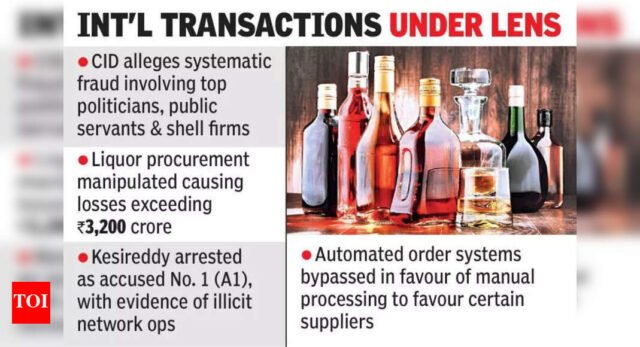Hyderabad: The Enforcement Directorate has registered an Enforcement Case Information Report (ECIR) in connection with the multi-crore Andhra Pradesh liquor scam, initiating a parallel investigation under the Prevention of Money Laundering Act. This move comes even as the AP Crime Investigation Department continues its probe into what it describes as a systematic criminal conspiracy involving top political functionaries, public servants, and shell companies.The CID investigation alleges large-scale manipulation of liquor procurement processes and suppression of select brands between Oct 2019 and March 2024, leading to wrongful gains exceeding 3,200 crore and causing substantial losses to the state exchequer.Rajasekhar Reddy Kesireddy, named as accused No. 1 (A1), has been arrested and produced before the court. According to the remand report, an intricate network was established in which officials allegedly bypassed automated order for supply (OFS) systems in favour of manual processes. OFSs were selectively issued to favoured suppliers in exchange for monthly kickbacks ranging from 150 to 600 per case, depending on the liquor brand category.The investigation found that C-Tel software—originally designed to ensure secure, automated OFS issuance—was disabled in Oct 2019. Officers claim this opened the door for discretionary allocation of liquor orders. The CID has examined over 128 witnesses and named 29 individuals or shell entities as accused. Statements recorded under sections 180 and 183 of the Bharatiya Nyaya Sanhita support charges framed under IPC sections 409 (criminal breach of trust), 420 (cheating), 120(B) (criminal conspiracy), and sections 7, 7A, 8, and 13 of the Prevention of Corruption Act. Seized evidence includes 74 hard drives, a laptop, more than 1,000 documents, and data tied to depot managers who allegedly impersonated govt retail outlet officials to manipulate OFS issuance.Kickbacks were reportedly collected in person, coordinated via encrypted communication apps, and routed to political beneficiaries. Favoured brands such as Adan’s Supreme, Daaru House XO, and Leela’s Blend were given preferential treatment, while established multinational brands like McDowell’s and Seagram’s saw their market share plummet from 53% to just 5% over a five-year period, the remand report said.








